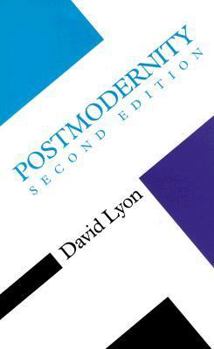Postmodernity
In the second edition of this highly successful text, postmodernity is seen as the social condition of the twenty-first century, in which some of the most familiar features of the modern world are not only called into question, but actually undermined by novel trends. The key carriers of the postmodern--new technologies and consumerism--emerged in thoroughly modern contexts, but so profoundly affect everyday social life that modernity itself is changing shape. Postmodernity is a way of describing a new society-in-the-making without supposing that modernity has been entirely left behind. While some dub these changes as "high" or "late" modern, this book argues that "postmodernity" best captures today's transformations or modernity.
Format:Paperback
Language:English
ISBN:0816632278
ISBN13:9780816632275
Release Date:May 1999
Publisher:University of Minnesota Press
Length:144 Pages
Weight:0.45 lbs.
Dimensions:0.5" x 5.3" x 8.5"
Customer Reviews
2 ratings
An excellent primer on postmodernity
Published by Thriftbooks.com User , 20 years ago
David Lyon's book Postmodernity is a very thick work though, in its entirety, it's only 131 pages. He covers the prophets of postmodernism (Nietzsche, Marx, and Heidegger) along with current influential postmodernists (Baudrillard, Derrida, Foucault, and Lyotard); the ideas of modernity and the debate over what exists today is "post," "hyper," "late," or "high" modernity; the social and cultural structures that characterize the age; and the ethical dilemmas that arise. He ends with a chapter with the "so what?" question. He says that we can either accept the postmodern, attempt to return to the modern, or go back to the premodern. Though by the time the reader arrives at Lyon's choice, it is obvious that the modern cannot be resuscitated, and the postmodern's "playfulness has passed of `anything goes'" (88). This leaves Lyon asking the postmodern, "to make space for a vision of a (re)new(ed) earth, that antique agent of social change, and the original partner of final judgement" (110). Lyon's clear, succinct writing demonstrates an awareness of the debates and nuances associated with choice of topics and language. His use of Blade Runner as an opening analogy for postmodernity, though lacking for those who haven't seen the movie, assures the reader that Lyon knows his audience and will translate the subject well. Not only that but David Lyon seems like a real guy who can relate to this life among discrepancies and inconsistencies while maintaining a sense of humor. He expresses this sense of humor by occasionally indulging himself in some fun with the ironies borne in postmodernists. For instance, Lyon writes that Derrida's "concept of deconstruction has entered the canon-forgive me-of postmodern critique" (18). Postmodernity opened my eyes to the breadth and intricate complexity of the (post)modern project.
An Excellent Primer on Postmodernity
Published by Thriftbooks.com User , 20 years ago
David Lyon's book Postmodernity is a very thick work though, in its entirety, it's only 131 pages. He covers the prophets of postmodernism (Nietzsche, Marx, and Heidegger) along with current influential postmodernists (Baudrillard, Derrida, Foucault, and Lyotard); the ideas of modernity and the debate over what exists today is "post," "hyper," "late," or "high" modernity; the social and cultural structures that characterize the age; and the ethical dilemmas that arise. He ends with a chapter with the "so what?" question. He says that we can either accept the postmodern, attempt to return to the modern, or go back to the premodern. Though by the time the reader arrives at Lyon's choice, it is obvious that the modern cannot be resuscitated, and the postmodern's "playfulness has passed of `anything goes'" (88). This leaves Lyon asking the postmodern, "to make space for a vision of a (re)new(ed) earth, that antique agent of social change, and the original partner of final judgement" (110). Lyon's clear, succinct writing demonstrates an awareness of the debates and nuances associated with choice of topics and language. His use of Blade Runner as an opening analogy for postmodernity, though lacking for those who haven't seen the movie, assures the reader that Lyon knows his audience and will translate the subject well. And not only that but that David Lyon is a real guy who can relate to this life among discrepancies and inconsistencies and maintain a sense of humor. He expresses this sense of humor by occasionally indulging himself in some fun with the ironies borne in postmodernists. For instance, Lyon writes that Derrida's "concept of deconstruction has entered the canon-forgive me-of postmodern critique" (18). Postmodernity opened my eyes to the breadth and intricate complexity of the (post)modern project.






